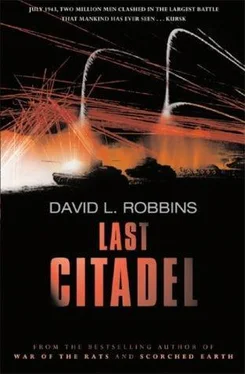The Tiger crept down the ramps, screeching and belching, surrounded and welcomed. When it was flat on the ground, two pairs of mechanics hammered at the tracks on either side, to knock out one of the pins that held the transport track sections together. The mammoth stood fuming under their blows; the small sledgehammers insignificant against what this tank’s armor could withstand, the hammer strikes like petting strokes.
While the pins were hammered out, the crew assembled the Tiger’s wider battle tracks on the ground at a spot twenty feet in front of the tank. Each cast-steel link weighed seventy-five pounds; the assembled tread would weigh well over a ton. A dozen men wrestled each link from the flatcar and hefted it into place, then pounded its pin in to join it to the whole. Luis sat on a fuel barrel watching the mechanics; when their Tigers roll over a mine in combat, or lose a track to an enemy shell, these mechanics would have to effect this repair on the battlefield, under fire, or lose the Tiger. No one was better at this than the Germans, Europe’s greatest machinists.
Once the pins on the transport treads were beaten out, the tank rolled slowly forward, allowing the unhinged tread to spool out onto the ground. The tank rolled across the earth on its bare wheels for a few meters, then crept up onto the new combat tracks. Mechanics on both sides guided the tracks over the sprockets with come-along rods. When the new tracks were in place, they were joined with the pins bashed back into place. The transport tracks on the ground were hooked to a tractor and dragged off. The first of the new Tiger tanks stood ready, leaving behind an exhausted crew staring at nine more groaning flatcars.
Luis watched the off-loading of the second tank, wondering if the mechanics would be able to get them all on the ground and re-treaded by dark. The tanks had been his charges for several days, he’d risked his own neck to protect them, and he felt little pangs when they were started up, refitted, and driven off without him.
While the third Tiger was idling on its flatbed, another SS captain walked over from the train platform. He leaned against a steel pillar beside Luis’s perch. The man was impeccably outfitted, every buckle and strap gleamed. A cigarette was pasted on his lips, his pale blue eyes were hooded and sleepy. He folded his arms and crossed his boots, standing on one leg, spewing smoke, rakish.
‘What do you think?’ He spoke without taking the cigarette from his mouth.
Luis turned to the man, the only one to talk to him in the hours since the train pulled in. He was one of the German SS, wearing the lightning bolt runes at the collars. Between the collar tabs hung an Iron Cross First Class. This captain was close to Luis’s age, the blond, lithe Aryan of posters. Luis felt something pleasant he’d missed for most of a year: He was drawn to another human. This captain was disdainful, confident with a cool carriage, the manner Luis considered best for soldiers and bullfighters. The man cut the figure that Luis imagined he would have without his wound.
‘About what?’ Luis answered.
‘The Tigers. What do you think? Are they worth waiting for? We’ve been putting off the attack until they got here.’
Luis couldn’t tell how to respond. Was he being baited into saving something negative? He didn’t know this captain; what was the man’s interest in the Tigers? Or in Luis?
He watched the next tank amble onto the ramps. The thing was huge, its cannon so powerful, the chassis and turret girded with the thickest armor of any tank ever produced. It would be operated by SS-trained crews. What did the Russians have to counter the Tiger or the SS? Luis envisioned the fire belching from the big cannon, Russian tanks bursting before it, Russian villages burning, his own hand – the old hand, the fleshy one – on the trigger.
Luis had arrived with the Tigers, defended them on the rails, and they remained under his protection until they were off the train and driven away. He felt loyal to these tanks. He would not criticize them simply to curry favor. And he would not utter anything good about the Russians. Is that what this captain wanted him to do? Luis watched the man grip his cigarette between long, elegant fingers. He noted the band on the captain’s left cuff, the words Leibstandarte Adolf Hitler emblazoned in silver thread. He was still drawn to this captain but now he felt competitive. He was in Leibstandarte , too. He felt the life of the partisan throb again in his knife hand. What has this captain done? Has he done that?
‘Yes,’ Luis said, ‘yes, of course they’re worth waiting for. Look at them. They were designed to be better than any tank in the world. What other tank has an 88 for a main gun? The Russians have just got 76s. Pop guns. The Tiger can sit back at two thousand meters and pick them off. What have the Russians got to match that?’
The captain puffed, not looking at Luis but at the growling Tiger being shucked of its transport treads.
‘What the Russians do have is twenty-five T-34s manufactured for every one of these Tigers,’ he told Luis. ‘When the Kursk battle starts, we’ll have Mark IIIs, IVs, Mark V Panthers, Mark VI Tigers, all of them mixed together. How do we expect to keep spare parts available for so many models? Tracks, transmissions, engines, wheels. But the Reds, they were smart, you see. They put only one tank on the field. The fast little T-34. If something breaks, there’s plenty of parts laying around for it. And every one of their soldiers knows how to fix the damn thing, it’s as simple as a wind-up toy. The Russians make one tank and they produce thousands of them a month. But do you know it takes over three hundred thousand man hours to build one Tiger? Yes, the Reds. The Untermenschen . They are smart about this.’
The captain brandished his smoky fingers while extolling the intellect of the enemy. Luis frowned at the suggestion that the Russians had out-thought Hitler.
‘That’s crap. What does it matter, when none of them can stop a Tiger? I don’t care how many T-34s the Reds have got. Each Tiger is worth a hundred of them. The armor is so thick…’
‘One hundred twenty millimeters on the gun mantlet, one hundred millimeters on the hull front,’ the fetching young captain interrupted. ‘Eighty millimeters upper-hull sides and rear, sixty on the lower sides. Turret front has one hundred millimeters, turret sides and rear, eighty. Twenty-five millimeters all horizontal surfaces. Impervious to the Russian .76 gun at distances greater than four hundred meters. Impenetrable by Russian tanks at any distance head-on.’
Luis paused. This man knew the tanks’ specifications. Luis nodded at the captain, though the man’s blue eyes stayed fixed on his tanks. And they were his Tigers, Luis realized. He was the one who’d come to Belgorod station to claim them.
The captain stood away from the pillar. He dropped his cigarette and trod on it, walking toward the grounded tank and the hammering mechanics. He raised a hand to point out his observations, assuming without looking that Luis was behind him.
‘Look at the armor. See how it’s straight up and down, like a giant shoe box? Hitler told his designers he wanted nothing of Russian design, those Untermenschen and their tanks. So instead of sloping the armor, which would have added a great deal of protection, the Tiger is a collection of flat faces. If the plating had been sloped like the T-34, the Tiger could have been made twenty to thirty percent lighter. Lighter means faster. Better range and maneuverability. But this big bastard is too heavy for its engine. It’s ponderous even under the best conditions.’
The captain walked to the rear of the Tiger, inhaling its engine fumes like the scents of a woman. He knows these tanks, Luis thought. He’s fought in them, he’s lost them and seen them killed and is furious with their flaws because he loves them. He knows these tanks must save Germany. And look at him. He wants a few more medals for himself. So he knows, too, the Tigers have to do their job before the Americans intervene, or there’ll be nothing left to win in Russia but your own life.
Читать дальше












